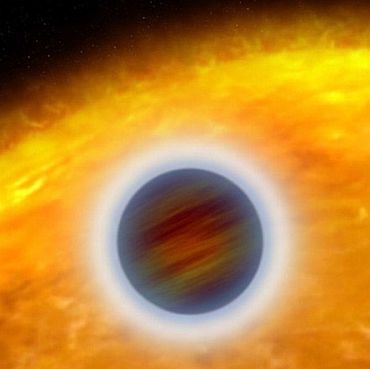 Astronomers have claimed that a planet discovered last year is the hottest ever found in the universe, where the temperature is a scorching 3,200C.
Astronomers have claimed that a planet discovered last year is the hottest ever found in the universe, where the temperature is a scorching 3,200C.
The scorching temperature of exoplanet, WASP-33b also known as HD15082, is explained by its close orbit around its star, itself one of the hottest planet-hosting stars at 7,160C; it's 380 light years away in the constellation of Andromeda, the Daily Mail reported.
In fact, the astronomers were first alerted to WASP-33b's existence in 2006, after observing regularly timed dimmings of its parent star. This was caused by the planet, four-and-a-half times the size of Jupiter, orbiting its star at less than 7 per cent the distance of Mercury from the sun.
This is not to be scoffed at considering the star's temperature of 7,160C dwarfs the sun's 5,600C. WASP-33b completes an orbit every 29.5 hours, say the astronomers.
A study led by Alexis Smith of Keele University in Staffordshire, and reported in New Scientist, discovered WASP-33b's
Its temperature is 900C hotter than what was formerly the hottest known planet in the Milky Way Galaxy -- WASP-12b.
The WASP-12b is so close to its sun-like star that it is superheated to 2,300C and stretched into a football shape by enormous tidal forces. It completes an orbit every 1.1days.
The atmosphere has ballooned to nearly three times Jupiter's radius and is spilling material onto the star. The planet is 40 per cent larger than Jupiter.
This effect of matter exchange between two stellar objects is commonly seen in close binary star systems, but this is the first time it has been seen so clearly for a planet, say the astronomers.
It confirms a prediction made last year by Shu-lin Li from Peking University. He theorised that the planet's surface will be distorted by the star's gravity and that gravitational tidal forces make the interior so hot that it greatly expands the planet's outer atmosphere.





